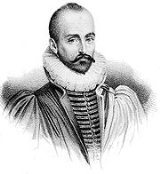
, known for popularising the essay
as a literary genre and is popularly thought of as the father of Modern Skepticism. He became famous for his effortless ability to merge serious intellectual speculation with casual anecdotes and autobiography—and his massive volume Essais (translated literally as "Attempts") contains, to this day, some of the most widely influential essays ever written.
Que sais-je?![]()
Je veux qu'on me voit en ma façon simple, naturelle, et ordinaire, sans étude et artifice; car c'est moi que je peins...Je suis moi-même la matière de mon livre.![]()
Certes, c'est un subject merveilleusement vain, divers, et ondoyant, que l'homme. Il est malaisé d'y fonder jugement constant et uniforme.![]()
As for extraordinary things, all the provision in the world would not suffice.![]()
In my opinion, every rich man is a miser.![]()
Things are not bad in themselves, but our cowardice makes them so.![]()
C'est de quoi j'ai le plus de peur que la peur.![]()
Je veux que la mort me trouve plantant mes choux.![]()
All the opinions in the world point out that pleasure is our aim.![]()
He who would teach men to die would teach them to live.![]()

